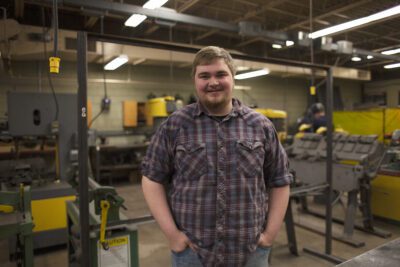 Southwest Initiative Foundation supports career readiness efforts as part of Grow Our Own’s cradle-to-career approach to closing the opportunity gap in our region.
Southwest Initiative Foundation supports career readiness efforts as part of Grow Our Own’s cradle-to-career approach to closing the opportunity gap in our region.
Parker Bramstedt doesn’t mind getting greasy and loves engines. He also has a big heart.
“At the end of the day, I love being able to help somebody — if that’s keeping a truck on the road so they can get food to a town or keeping a tractor running so a farmer can plant a field,” said Parker, a senior at Windom Area High School who wants to be a diesel technician.
He’d considered a few other careers — engineering, welding, manufacturing. The new Windom Career Pathways program let him try out those opportunities and see what fit best.
The Pathways Program launched at the start of the 2018-19 school year and has five pathways for students to explore: Agriculture and Manufacturing, Health Science, Education, Business and Marketing and Information Technology. Many courses offer credits that give students a jump on post-secondary education and connect students to outside opportunities.
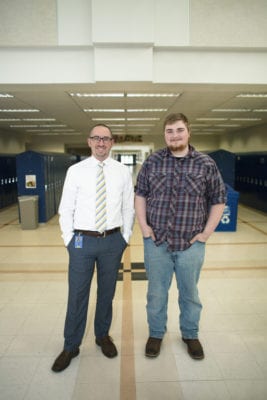 “The coursework students are doing is far more hands on and practical than before. And the courses are very popular; that tells me a lot,” said Principal Bryan Joyce, who has 13 years of teaching experience and is passionate about advancing work-based learning.
“The coursework students are doing is far more hands on and practical than before. And the courses are very popular; that tells me a lot,” said Principal Bryan Joyce, who has 13 years of teaching experience and is passionate about advancing work-based learning.
While Parker loves engines, he’d never had a chance to rebuild one entirely himself until he took Intro to Mechanics in the Manufacturing and Engineering Pathway. He has been under the hoods of cars and trucks his whole life, which helped when fuel started pouring out of the carburetor of his project and all over his sweatshirt. He worked on the small four-cycle engine until “it just ran like a top. It’s a nice thing when you get something and it doesn’t run, and you take it apart and you rebuild it and then you see it run and work the way it should,” Parker said.
In addition to hands-on classes that help him hone and apply skills, Career Pathways connected Parker with an internship at Ziegler CAT in Jackson. Ziegler deals in construction and farm equipment and employs Intern Technicians at locations across the upper Midwest. Its internship program is primarily for technical school and college students. Chris Jones, branch operations manager for Ziegler in Jackson, said Parker is the first high school intern his branch has hired.
“How do we get these young people that want to get into the trade? We have to start them as sophomores, juniors and seniors,” said Chris, who manages 21 full-time technicians over two shifts and is always looking for more to hire.
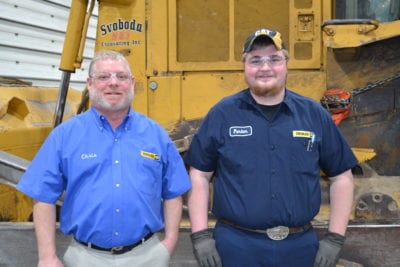 Ziegler Intern Technicians assist in troubleshooting and repairing heavy diesel engines and construction and agriculture equipment in a shop environment. They learn to respond to customer needs in a positive, supportive, and timely manner to ensure maximum value for work performed.
Ziegler Intern Technicians assist in troubleshooting and repairing heavy diesel engines and construction and agriculture equipment in a shop environment. They learn to respond to customer needs in a positive, supportive, and timely manner to ensure maximum value for work performed.
“I’ve learned a lot there; it’s a big jump from working at a small shop,” said Parker, who has also worked at a local towing company in Windom. “After my first week at Ziegler, I had my own laptop.”
Parker also has a toolbox that was his dad’s, and his grandpa’s before that.
“I’ve got a lot of tools that my grandpa had. My grandpa worked for the state as a mechanic for 40 years before he retired. He’s got tools he wasn’t going to use anymore, and he gave them to me because he knows I’m going to be going to school for something he did,” Parker said.
This fall, Parker plans to attend Alexandria Technical and Community College for a diesel technician degree. Then, he sees his career path leading him back home for the opportunities and the lifestyle: “I’m more of a country kid.”
A COMMON PURPOSE: Vibrant Community
Windom Public School District serves about 1,100 students, split evenly between grades K-5 and 6-12. In 2018, voters overwhelmingly approved a bond vote for construction of a new elementary school and an expansion of the high school’s career and technical education programming, including a new 7,100 square foot career and technical education expansion and remodel now under way. It will have an auto shop, welding and medical careers spaces.
Windom’s business community has also taken an active role, including through a Pathways Advisory Committee made up of business leaders. Cottonwood County experienced a 4.4 percent job growth according to a trend report published by Minnesota Compass before the coronavirus outbreak. As the economy recovers, these positions will need to continue being filled. The pandemic has reinforced the growing need for more healthcare professionals in our rural communities and beyond.
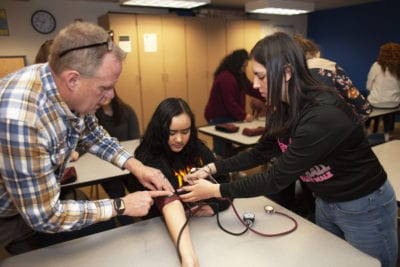
Emily Masters is the Chief HR Officer at Windom Area Health and serves on the committee. She sees benefits from this education model as an employer and community member. The Health Science Pathway provides job shadowing opportunities and weekly speakers on topics like insurance, politics, clinicals and more. She noted that for employers, a partnership like this involves time, energy, policies and some risk: “If you can get past some of these barriers, the return is tenfold,” Emily said.
Grants have been key to launching Windom’s Career Pathways Program. Southwest Initiative Foundation (SWIF) is the hub agency for a Greater Twin Cities United Way (GTCUW) grant —funded in large part by the Bush Foundation — that’s supporting readiness efforts in the Windom, Worthington and Jackson County Central school districts.
“Just the coordination of resources has been really vital for us. If we don’t have an answer, Southwest Initiative Foundation can connect us to someone who does. I really appreciate that we can get ahold of them for anything,” Principal Joyce said.
Scott Marquardt at SWIF is supporting the three school districts engaged in this program.
“With the generous financial investment and ongoing technical assistance from the GTCUW, visionary leadership of school administration and faculty, incredible engagement of the private sector, and strong collaboration with our regional partners, students in these three districts receive outstanding experiences and educational opportunities to help build the talent pipeline that our region’s businesses need to compete in a global marketplace,” Scott said.
“It’s exciting that you have so many people coming together around a common purpose,” Principal Joyce said. “We have to have a team approach and keep our minds on what keeps our community vibrant in the future.”
Growing good things
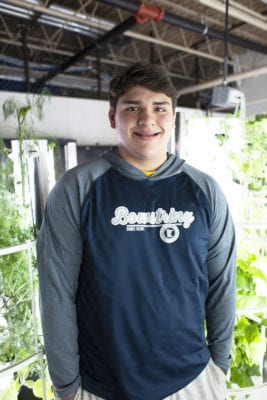 Diego Martinez is a freshman at Windom Area High School who’s been playing varsity football since 8th grade. He’d like to play professionally but knows it’s a long shot. He’s interested in the Health Science Pathway and becoming a physical therapist.
Diego Martinez is a freshman at Windom Area High School who’s been playing varsity football since 8th grade. He’d like to play professionally but knows it’s a long shot. He’s interested in the Health Science Pathway and becoming a physical therapist.
This school year, Diego learned to care for plants in the Green House Management course, part of the Agriculture Pathway. Students are responsible for planting, harvesting and managing a hydroponic tower garden.
The towers are futuristic white poles dotted with bouquets of green plants, all of it gleaming under grow lights. Lettuce is the main crop and is served in the school cafeteria. Diego notes students also see how well they can grow other plants hydroponically. Among the greens, an experimental sunflower raises its yellow head. The test plants are a way students learn to take risks to see if their ideas take root – or not.
“It could be a good risk or a bad risk,” Diego said. “You learn to care for something, too. It’s almost like having a pet.”
This story appeared in the 2020 Spring/Summer Connect newsletter.
Read Our NewsletterSouthwest Minnesota Private Industry Council, Southwest/West Central Service Cooperative, and Minnesota West Community and Technical College are partners in the Windom Career Pathways Program, ensuring this grant project complements and leverages other education and workforce development underway, including the regional LYFT career pathways initiative funded by the state legislature. Projects like these are part of Southwest Initiative Foundation’s Grow Our Own efforts, which aim to support all southwest Minnesota kids from cradle to career.



